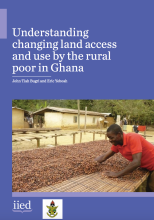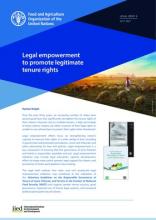/ library resources
Showing items 1 through 9 of 9.Land in Cameroon is under growing pressure for many reasons — powerful commercial interests, changing climate conditions and shifting demographic flows including mass migration and increasing population density.
This is the executive summary of the full report Securing land rights at scale.
This Study discusses the human rights issues raised by large-scale land deals for plantation agriculture (‘land grabbing’) in low and middle-income countries. Firstly, the Study takes stock of available data on large land deals, their features and their driving forces.
Includes the drivers of change; changes in ‘customary’ land management institutions – evidence from West Africa; changes in intra-family relations; changes in land transfer mechanisms – evidence from West Africa; case study of changes in ‘customary’ resource tenure systems in the inner Niger Delt
In Ghana 70 per cent of the population are smallholder farmers who depend on the land for their basic needs. Growing competition for this resource is having significant impacts on rural livelihoods and governance as land changes hands.
Over the past 30 years, an increasing number of states have passed good laws that significantly strengthen the tenure rights of their citizens.
This report reflects on the experience of DFID land programmes which include LTR across six countries (Guyana, Rwanda, Nigeria, Ethiopia, Tanzania and Mozambique), drawing also on relevant experiences of programmes driven by other donors.
This bulletin focuses on land tenure regularisation (LTR), with articles from practitioners to accompany the new LEGEND report Securing land rights at scale: eight lessons and guiding principles on land tenure regularisation.
Land Library Search
Through our robust search engine, you can search for any item of the over 73,000 highly curated resources in the Land Library.
If you would like to find an overview of what is possible, feel free to peruse the Search Guide.






